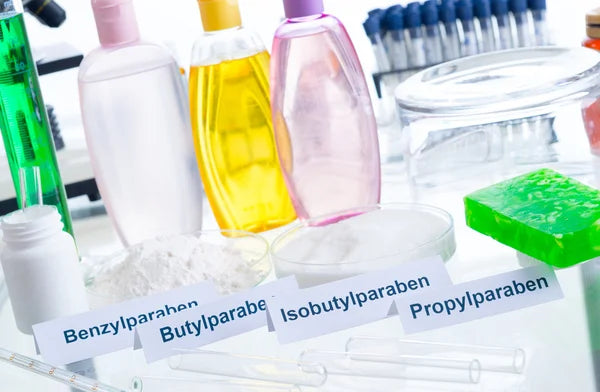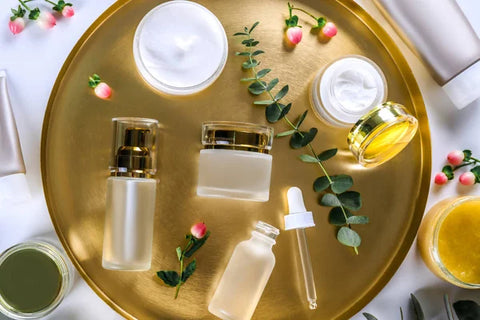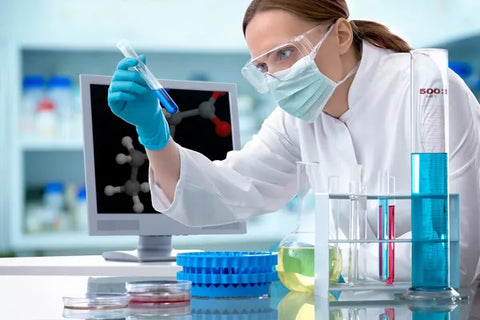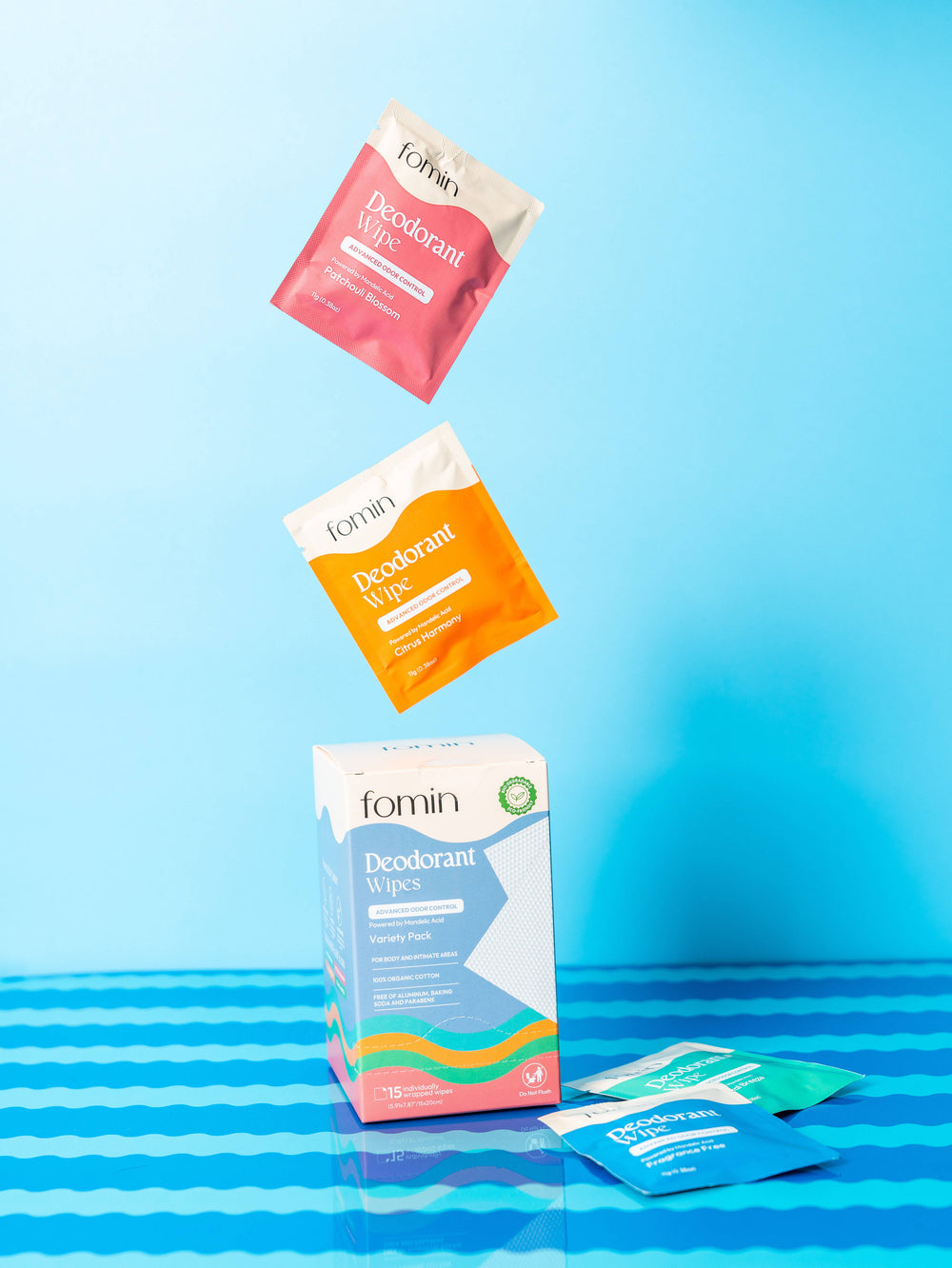
What Are Parabens and Why Are They Harmful?
Share
Have you ever seen the ingredient list on your shampoo, skincare, or lotion bottle and seen the word "paraben" but weren't sure what it meant? Parabens are chemicals used as preservatives in many beauty and personal care products.
While they help prevent the growth of bacteria and mold in these products, there has been concern about their potential harm to our health. So, in this article, we'll explore the questions: What are parabens, and why do some people believe they could be harmful? Let's discuss the facts!
What are Parabens and Why Are They Bad?
Parabens are a group of synthetic preservatives widely used in cosmetics, pharmaceuticals, and food products to prevent bacterial and mold growth. They are inexpensive, effective, and have been used since the 1920s.

The concern about parabens arises from studies suggesting that they may have potential health risks. Parabens have been found to mimic estrogen, which plays a role in the development and function of the reproductive system. Some research studies have detected parabens in breast tumors, leading to concerns about their potential role in breast cancer development.
Types of Parabens
When reading the ingredient list of items such as shampoo or foundation, you might encounter the names of six common types of parabens:
- Methylparaben
- Ethylparaben
- Propylparaben
- Isopropylparaben
- Butylparaben
- Isobutylparaben
What Are Parabens In Shampoo?
Parabens are a group of synthetic preservatives used in shampoo to prevent the growth of bacteria, mold, and yeast. It is the derivative of para-hydroxybenzoic acid (PHBA) that helps prolong the shelf life of these products and prevent spoilage.
Adding parabens to these foods extends their shelf life, reducing the risk of consuming unsafe food. Certain foods, like blueberries and barley, naturally contain parabens.
What Are Parabens In Skin Care?
Parabens are preservatives commonly used in skincare, cosmetic, and personal care products to prevent the microbacterial growth.
They are a group of synthetic compounds widely used for their effectiveness and low cost. The most common parabens in skincare products include methylparaben, ethylparaben, propylparaben, butylparaben, and isobutylparaben. They are added to lotions, moisturizers, shampoos, and makeup to extend their shelf life and maintain product quality.
What Are Parabens And Sulfates, And Why Are They Commonly Used In Products?
Parabens are the commonly used chemical in personal care items, used to prevent the growth of fungus, bacteria, or microbes. Meanwhile, sulfates are the active compounds responsible for cleansing and generating the satisfying lather experienced in products like body washes, shampoos, and toothpaste.

Both ingredients are harmful to the skin as they irritate and cause allergies. Moreover, some studies also suggest that paraben may even cause cancer.
Parabens and Your Health
Scientists are currently investigating the potential health impacts of parabens. It's known that when using personal care products containing parabens, your skin absorbs them. Additionally, consuming propylparaben foods or beverages with parabens listed as ingredients exposes you to these chemicals.
Hormone Disruption
One major concern regarding parabens is their potential to disrupt hormones in the body. Studies indicate that once inside the body, parabens can mimic estrogen, affecting fertility, reproductive development, and birth outcomes. There's also evidence suggesting a possible link between parabens and early puberty in girls.
Cancer
Another area of study is whether parabens are linked to breast cancer rates. Moreover, using personal care products containing parabens, especially methylparaben, may contribute to UV-induced damage to skin cells and disrupt cell proliferation.
When combined with other estrogenic chemicals, parabens might influence the development of malignant melanoma (skin cancer) due to their estrogenic and genotoxic activities.
Developmental and Reproductive Toxicity
Propyl and butyl parabens seem to decrease sperm production and lower testosterone levels, whereas methyl and ethyl parabens do not impact sperm production. Additionally, exposure to butylparaben during gestation and lactation has been found to alter the development of reproductive organs and sperm production.
Paraben-Free Products
While parabens play a crucial role in preserving product freshness and effectiveness over time, the evidence suggests the adverse effects on reproductive systems and the dangers of propylparaben cancer.

As a result, Fomin offers a variety of free of paraben and sulfate products, which include:
Final Words
After reading our guide on what are parabens, you’re now aware that these are synthetic preservatives commonly used in shampoo, skincare, and cosmetics. Studies suggest possible links between parabens and hormone disruption, cancer development, and reproductive toxicity.
Moreover, Fomin's range of paraben-free products provides a reassuring option for those seeking safer alternatives without compromising quality.
Clean, Conscious & Convenient: Fomin's Contribution to a Plastic-Free World
Fomin is committed to playing a pivotal role in creating a plastic-free world. With every product we offer, we aim to make a positive impact. Our dedication to sustainability is reflected in our packaging, which is 100% TUV-certified material. We proudly hold Plastic Bank certification, ensuring that 12 plastic bottles are saved from entering our oceans with each purchase.
The statistics on plastic pollution are alarming. Annually, over 10 million tons of plastic end up in our oceans, endangering marine life and ecosystems. Fomin believes in taking a stand against this crisis, offering eco friendly alternatives that not only clean effectively but also contribute to a cleaner, more conscious, and convenient world.
FAQs
What Are Parabens In Shampoo?
Parabens in shampoo are a preservative that prevents bacteria and mold yeast growth from extending their shelf life.



